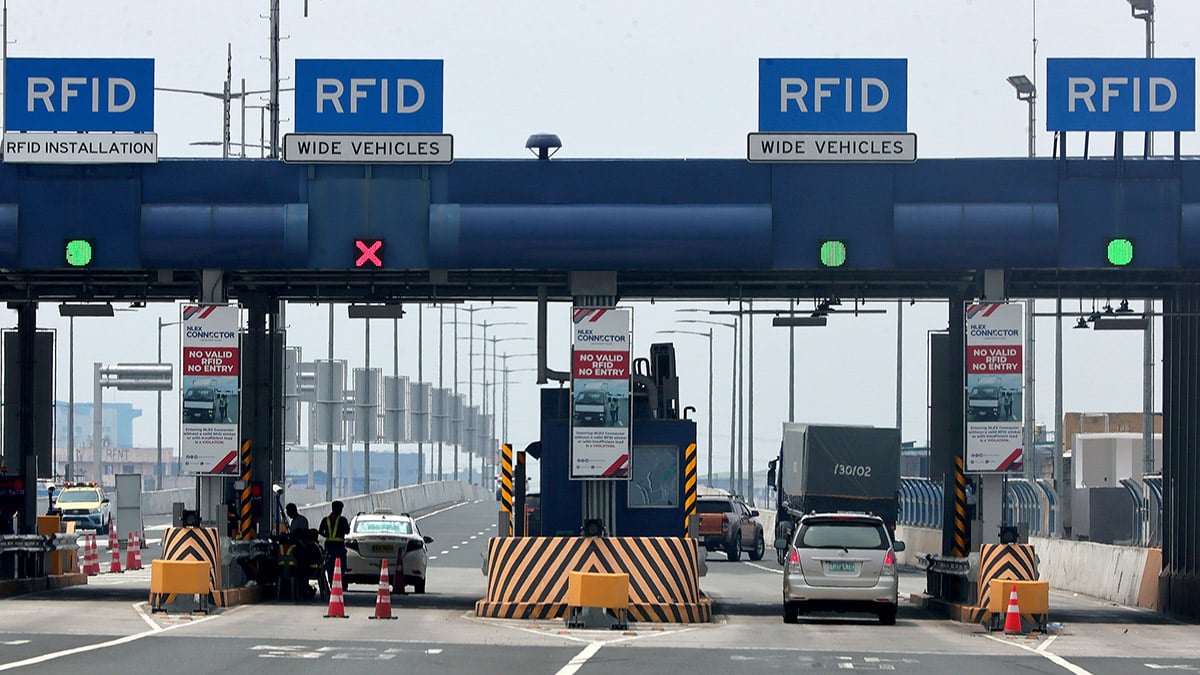
RISKY TOLLWAY Motorists pass by the RFID lanes of the NLEx Connector ramp in Manila. —Grig C. Montegrande
MANILA, Philippines — The Department of Transportation (DOTr) has postponed for a second time the imposition of fines on motorists who enter toll highways in the greater Metro Manila area without radio frequency identification (RFID) tags, Malacañang said on Sunday.
The penalty was supposed to be enforced on Oct. 1 but would be deferred until further notice, according to the Presidential Communications Office (PCO).
In a statement, the PCO quoted Transportation Secretary Jaime Bautista as saying that the new moratorium was part of the agency’s move to ensure that its toll and traffic strategies aligned with President Marcos’ goal of fixing perennial traffic problems hounding the metropolis.
READ: Fines await those without RFID, with insufficient load by Aug. 31
“The DOTr has the tools to address congestion on major roads but is taking time for a thorough review to ensure these solutions meet motorists’ needs,” he said.
Bautista, however, clarified that the new toll regulation may be implemented starting January 2025, but disregarding the penalties.
He didn’t give a timetable on when the penalties would come into effect.
Beyond their control
The deferment comes on the heels of a House resolution signed by 30 lawmakers that called on the DOTr to delay the implementation of Joint Memorandum Circular (JMC) No. 2024-001 until the Toll Regulatory Board (TRB) had fixed all defects of the cashless toll payment system.
The lawmakers noted that the joint circular “punishes motorists for possible violations beyond their control,” as they scored the DOTr for its supposed failure to address concerns over the cashless toll collection system.
They recalled that the early implementation of the scheme had been “marred [by] several issues, such as the availability of RFID tags, readability of RFID tags, unauthorized charges and real-time account balances, among others.”
It will be the second time for the DOTr to postpone the implementation of JMC 2024-001, which it issued on Aug. 1 together with its two attached agencies, the TRB and the Land Transportation Office (LTO).
The circular authorizes the installation of “No RFID, No Entry” and “No Sufficient Load, No Entry” signs at toll gates.
Vehicle owners who enter tollways without valid RFID tags or “electronic toll collection” (ETC) devices—or those with defective ones—shall be meted a fine of P1,000 for the first offense, P2,000 for the second offense, and P5,000 for the third offense.
It also penalizes motorists who enter the toll highways without sufficient load balances on their accounts, imposing a fine of P500, P1,000 and P2,500, for the first, second and third offenses, respectively.
License suspension
A fourth violation committed within one year shall also cause the confiscation of the erring driver’s license and the vehicle license plate and a 90-day suspension of the vehicle registration, according to the circular.
The JMC was set to be implemented on Oct. 1 after it was moved from the original target implementation on Aug. 31.
The DOTr will gather feedback from recent public consultations, including data on violators, which will then be analyzed to guide potential amendments to the joint circular, Bautista said.
According to the transportation chief, the deferment is meant to comply with the instruction of the President at the April 2024 Traffic Summit for government agencies to “provide innovative solutions to traffic congestion at major thoroughfares.”